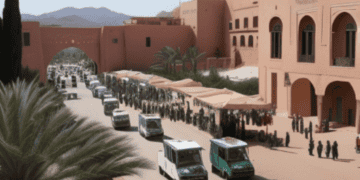The International Monetary Fund (IMF) and the World Bank are convening in Morocco, just weeks after a devastating earthquake that claimed nearly 3,000 lives. This meeting, which is part of their annual gatherings usually held outside their Washington headquarters every three years, is notably the first on African soil in half a century.
Initially scheduled for 2021 in Marrakesh, the meeting was postponed twice due to the COVID-19 pandemic. The IMF Managing Director, Kristalina Georgieva, emphasized the importance of Africa’s prosperity for the global economy in a recent speech.
One significant development at this meeting is the expected addition of a third seat for Africa on the executive boards of both the IMF and the World Bank. This move is intended to strengthen Africa’s voice in these institutions.
The meeting comes at a time when developing economies are grappling with the aftermath of multiple global shocks, including the COVID-19 pandemic, natural disasters, and the economic impacts of the war in Ukraine on energy and food prices. One of the key topics is the resistance from major contributors to a capital increase, which would require them to provide additional funds and potentially increase the influence of emerging economies like China and India.
The World Bank is anticipated to announce plans to increase its lending capacity by $50 billion over the next decade through changes to its balance sheet. Its President, Ajay Banga, is advocating for an even larger increase in capacity, potentially up to $125 billion, with support from advanced economies.
The meetings may also focus on reforming the quota systems of the lenders. These quotas, based on a country’s economic status, determine their contributions, voting power, and borrowing limits within the IMF.
In response to the recent earthquake in Morocco, the IMF has approved a $1.3 billion loan to assist the country in enhancing its disaster preparedness and resilience. Morocco, which has previously relied on loans and credit facilities to navigate economic challenges, including the impact of the pandemic on tourism and exports, is being encouraged by the IMF to balance its budget and continue raising interest rates.
Activists are planning a march in Marrakesh during the meetings to call for decisive action against climate change and debt. The Kenya-based organization Oxfam reports that 57 percent of the world’s poorest countries are expected to cut public spending by a total of $229 billion over the next five years.
Stay updated with supply chain news at The Supply Chain Report. Learn more about international trade at ADAMftd.com with free tools.
#IMF #WorldBank #MoroccoMeetings #AfricaProsperity #GlobalEconomy #DisasterPreparedness #ClimateAction #DebtRelief #Oxfam #MarrakeshSummit #GlobalShocks #CapitalIncrease #IMFReform #WorldBankLending #AjayBanga #QuotasReform #EconomicRecovery #PandemicImpact #UkraineWar #EnergyCrisis #FoodPrices #DevelopingEconomies #Resilience #EarthquakeRecovery #AfricaRepresentation #KristalinaGeorgieva















